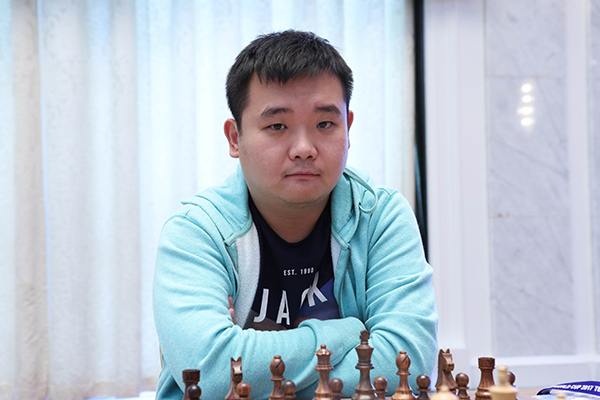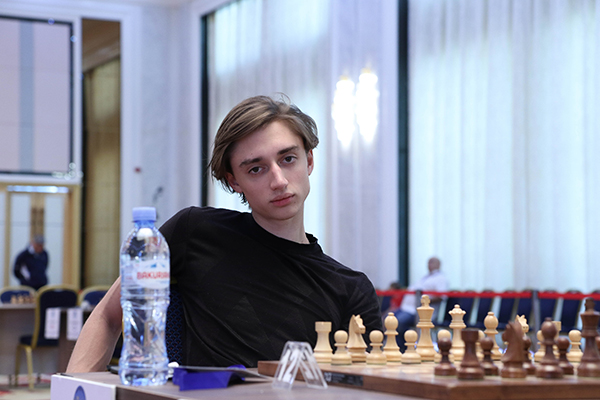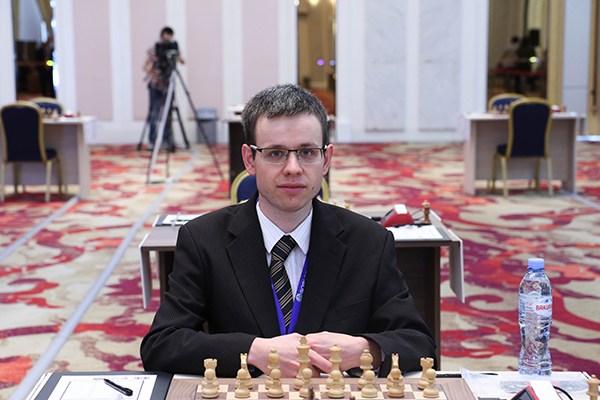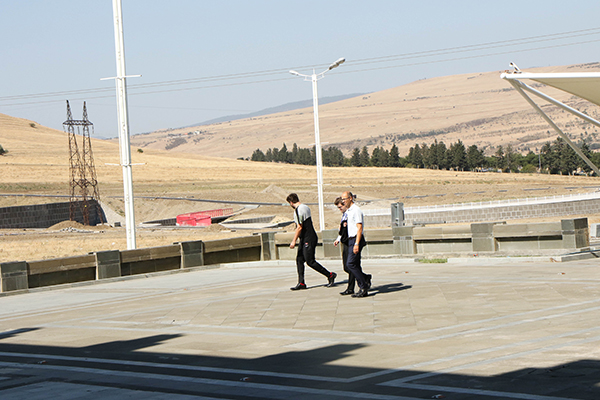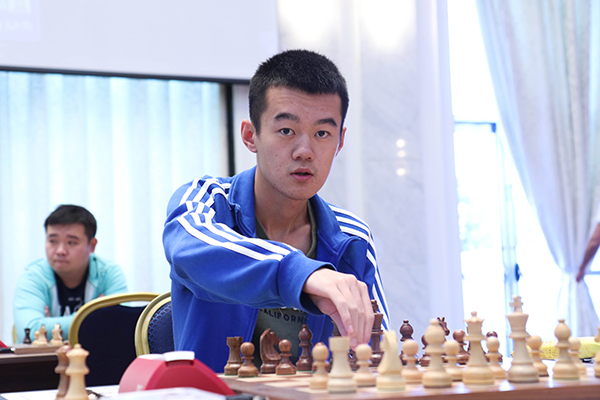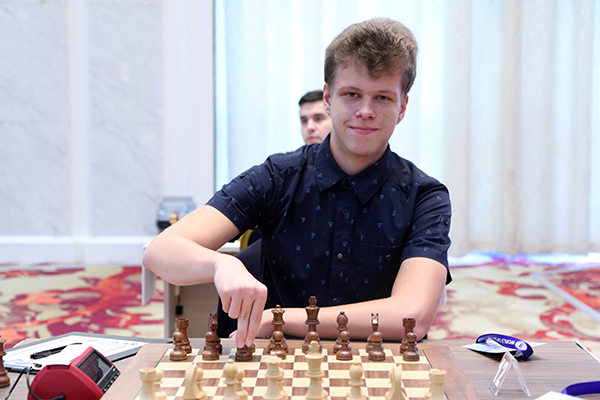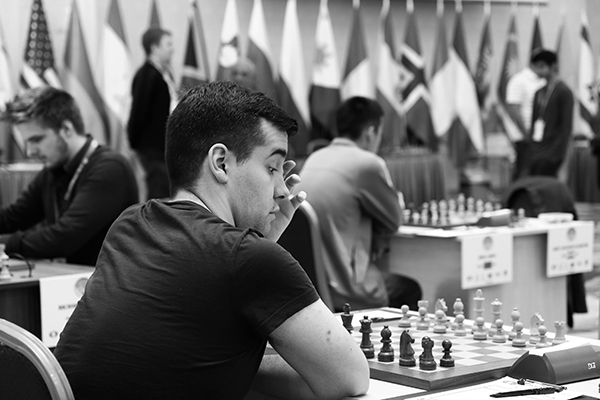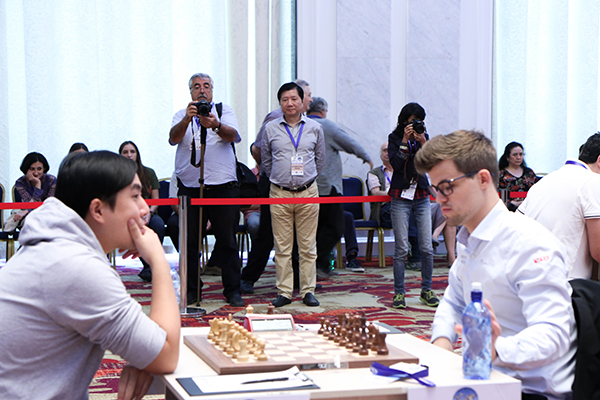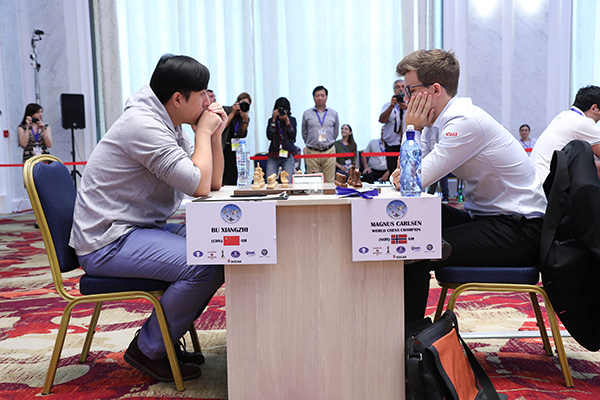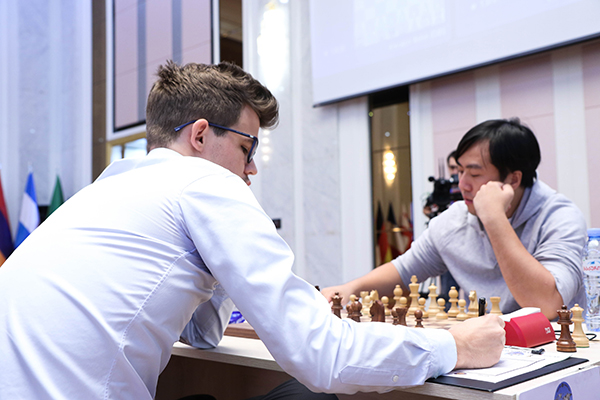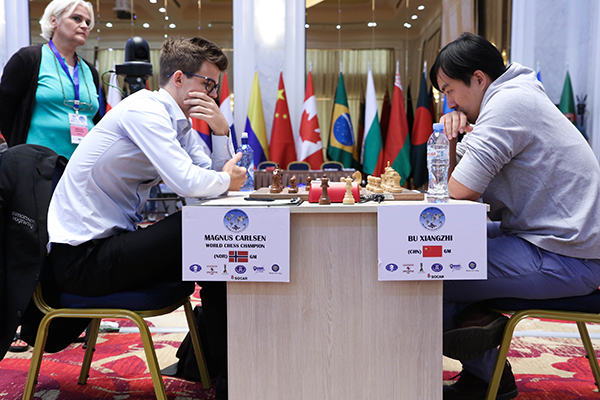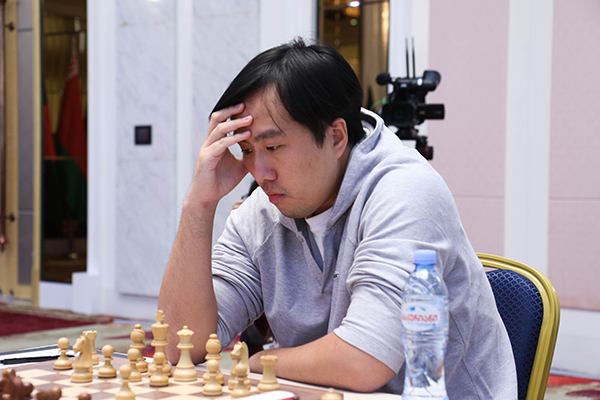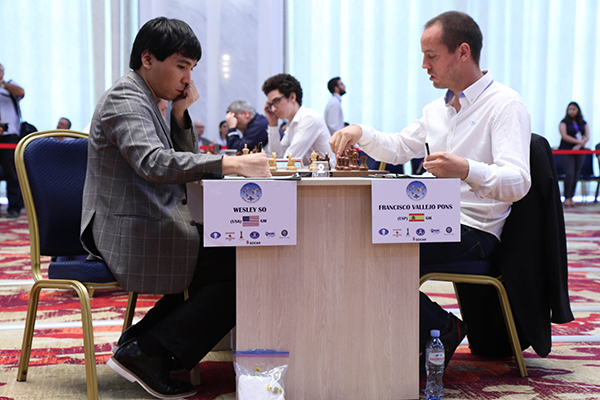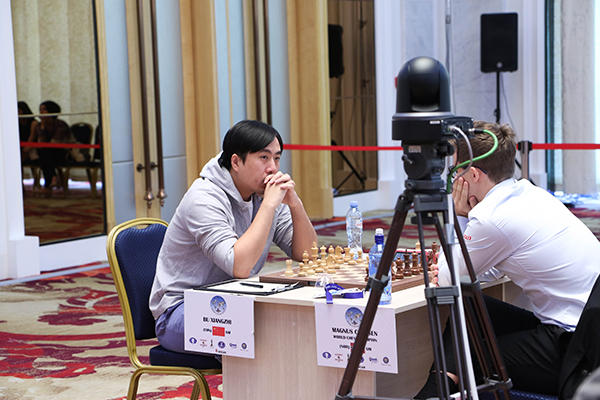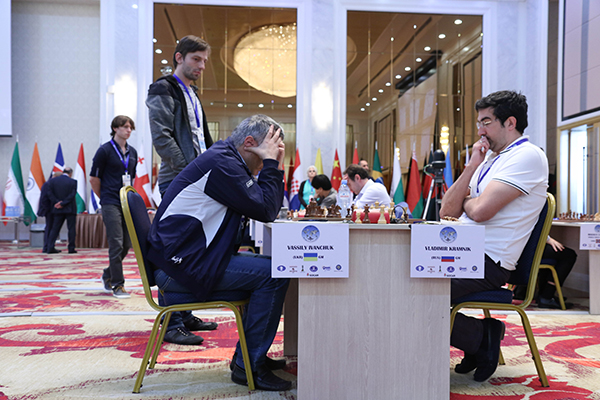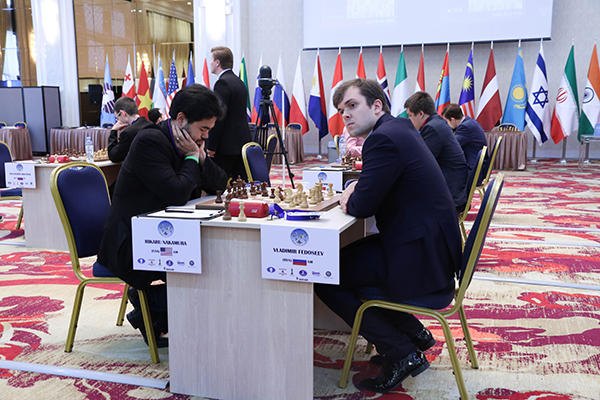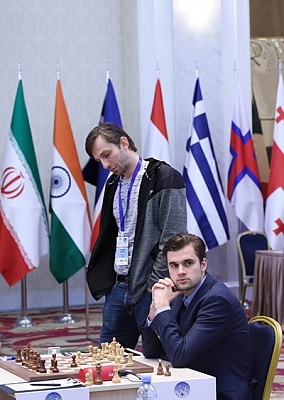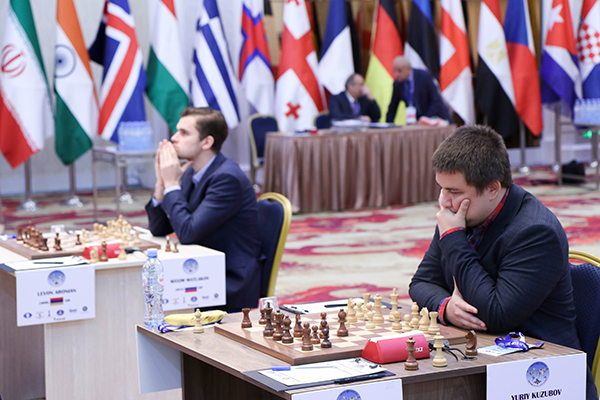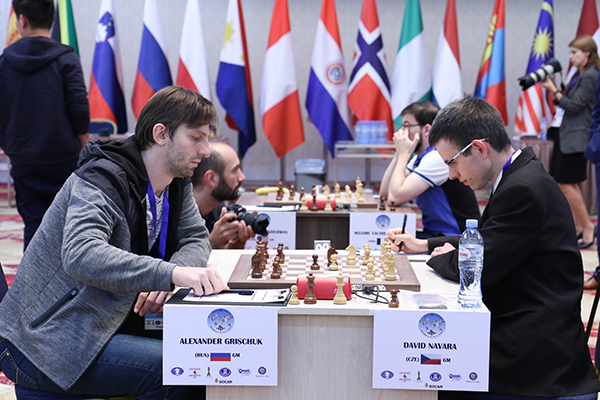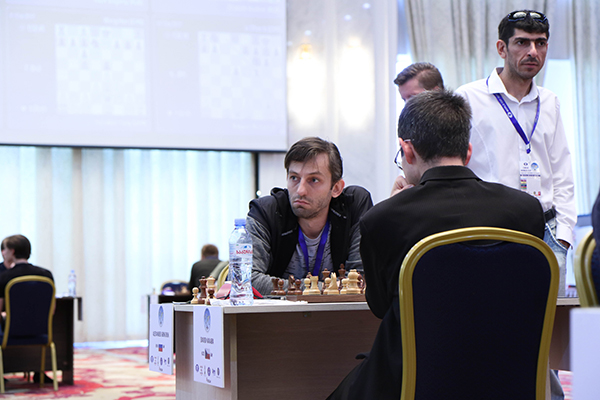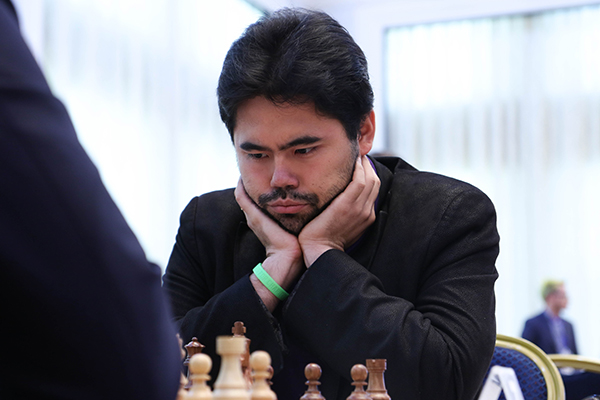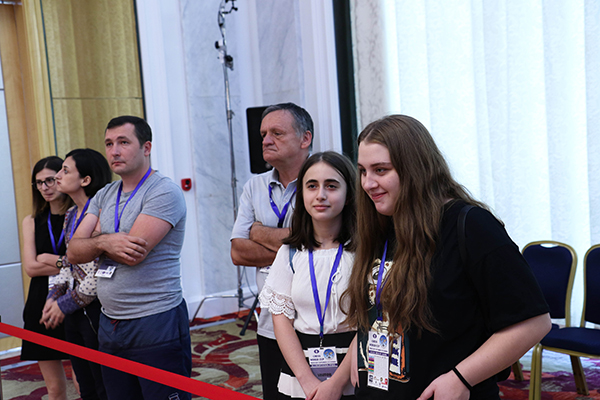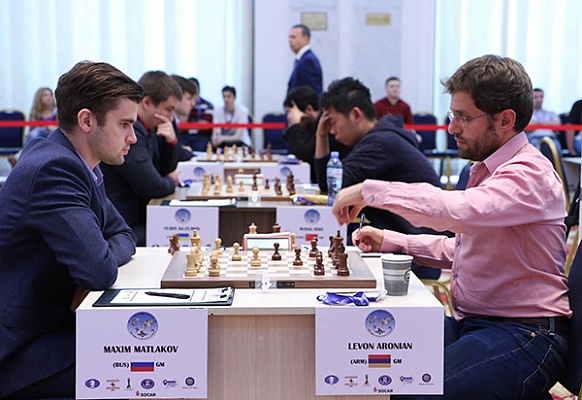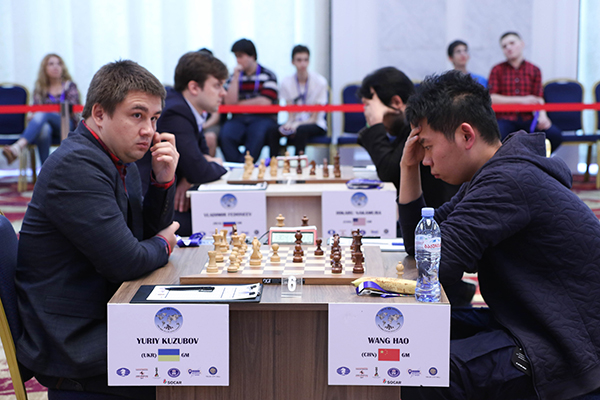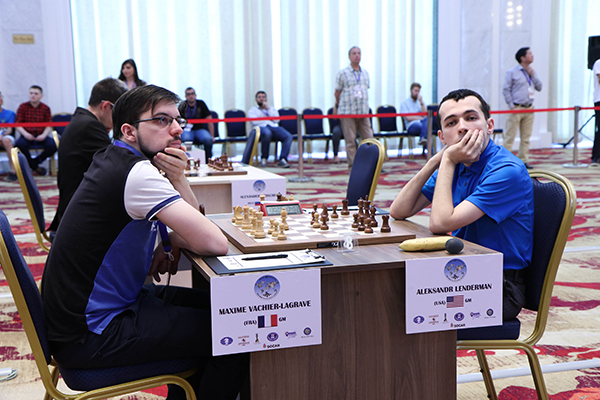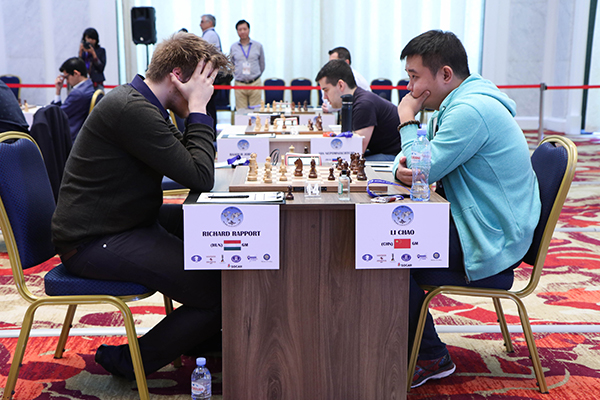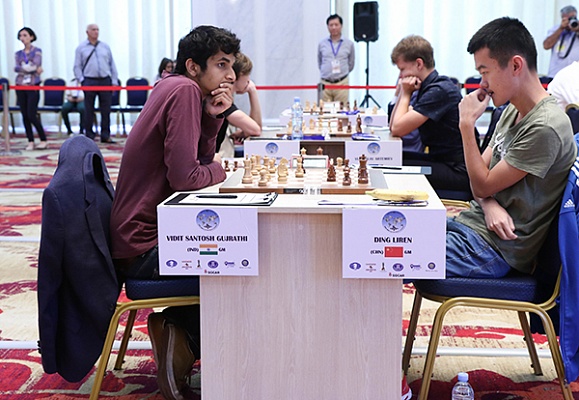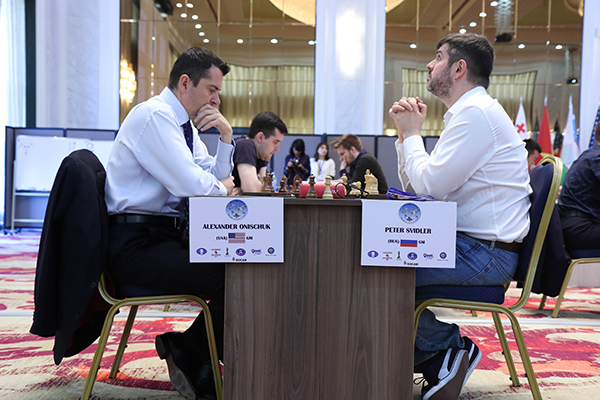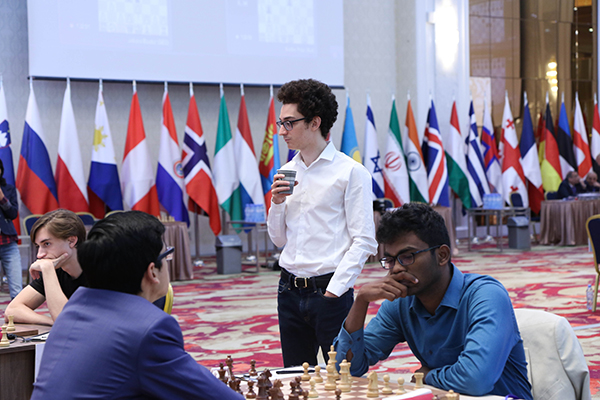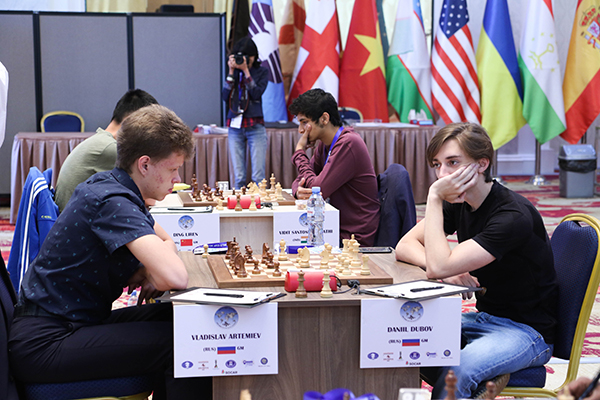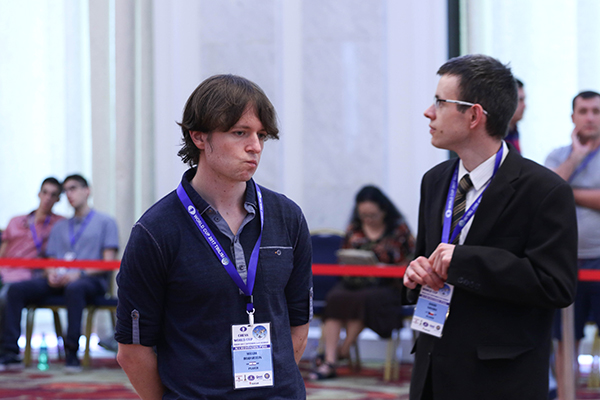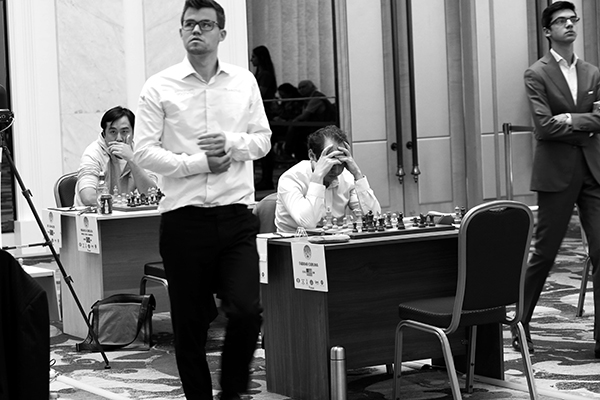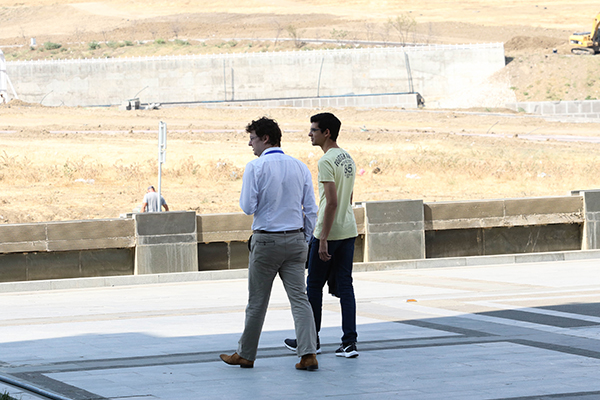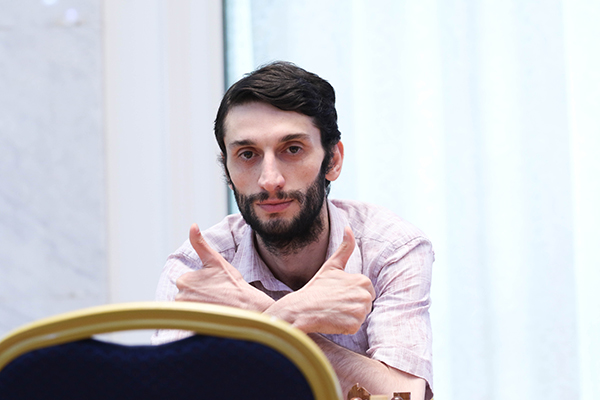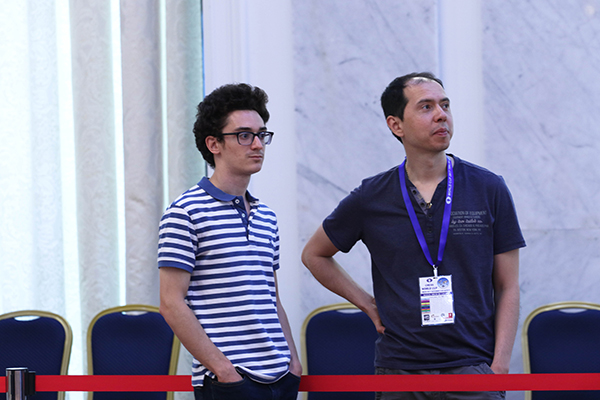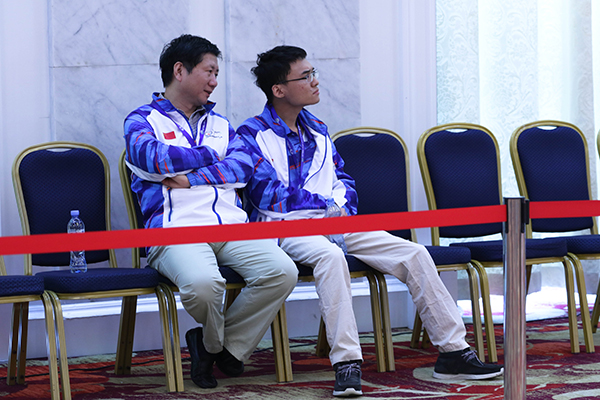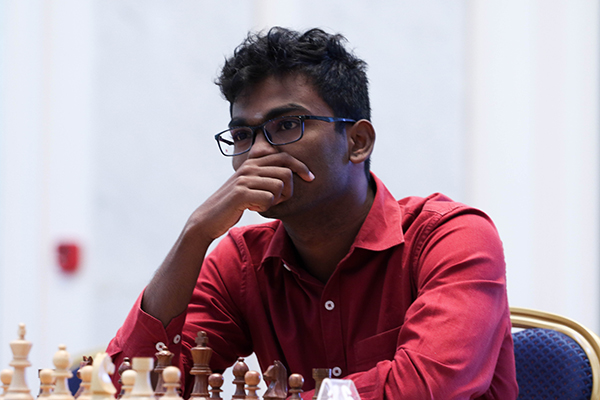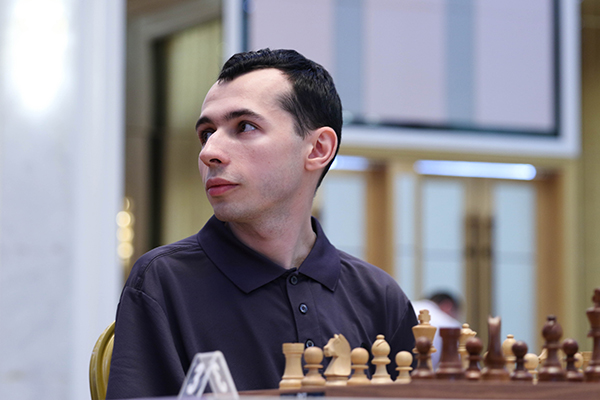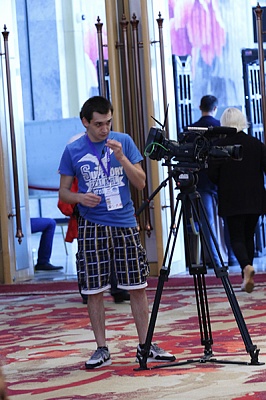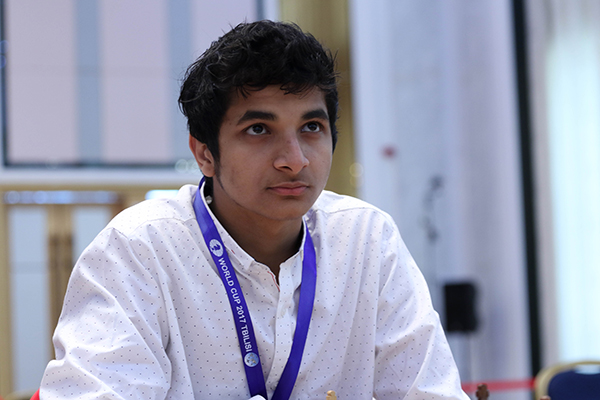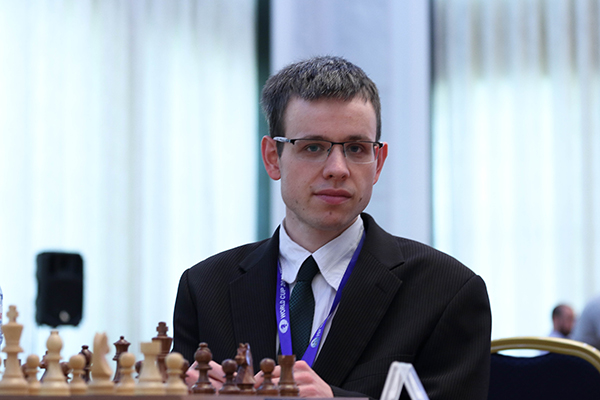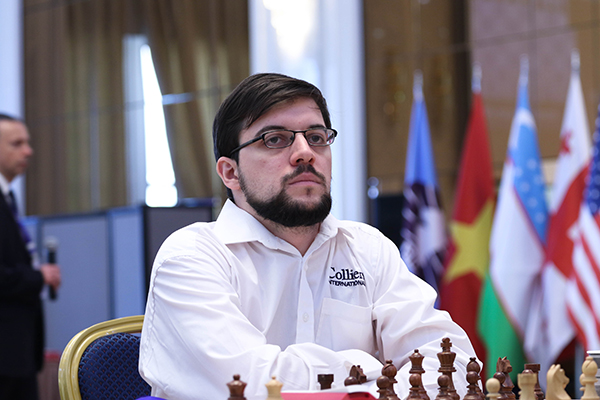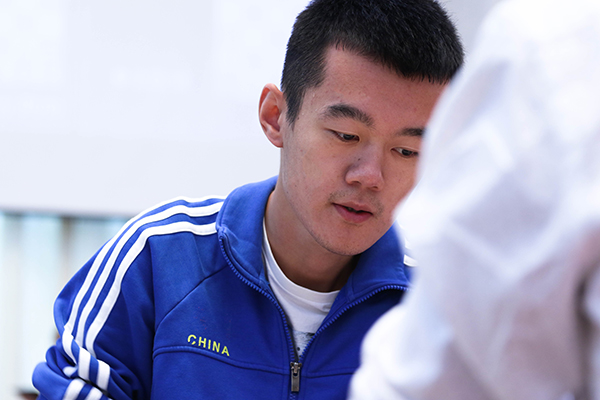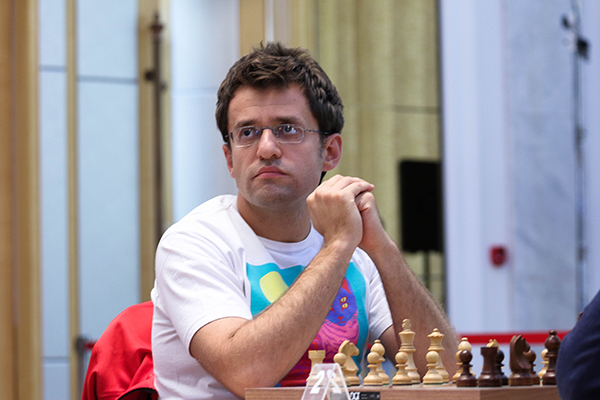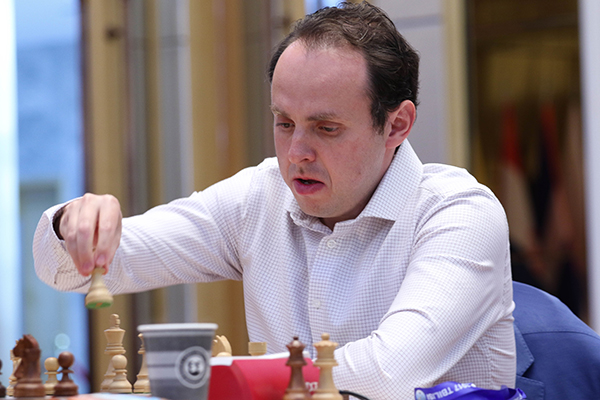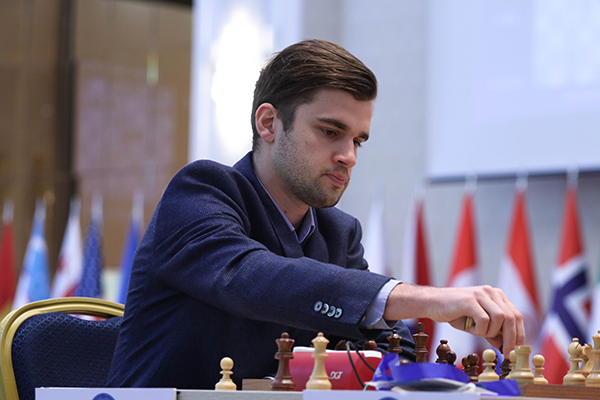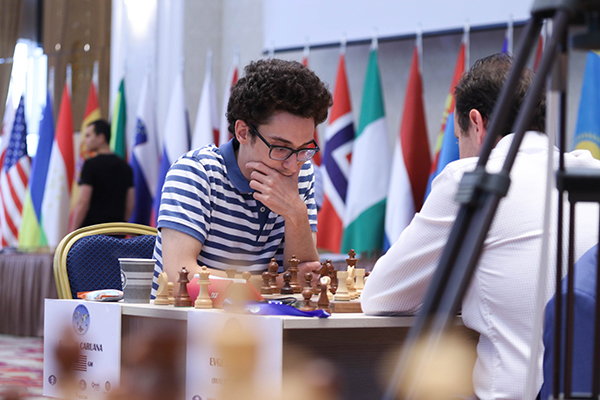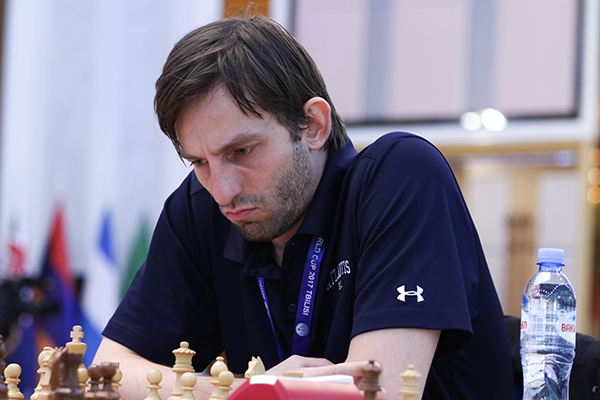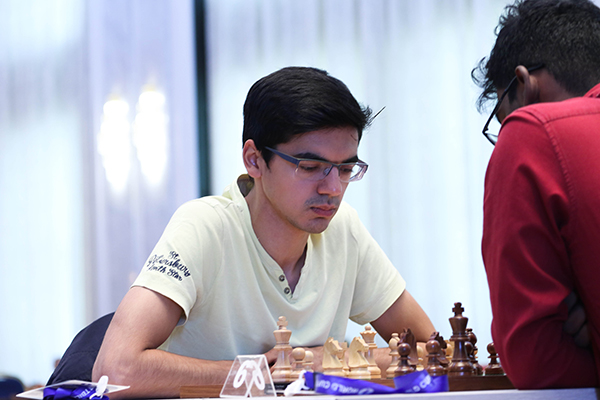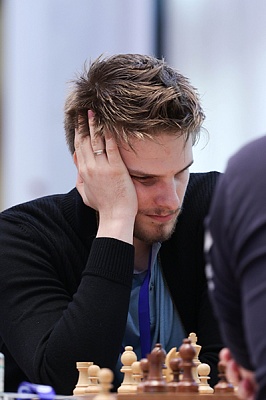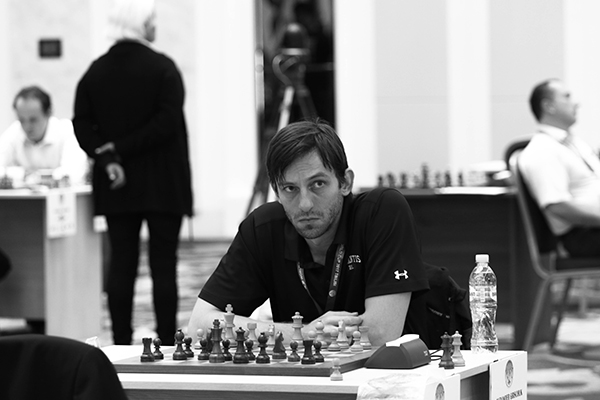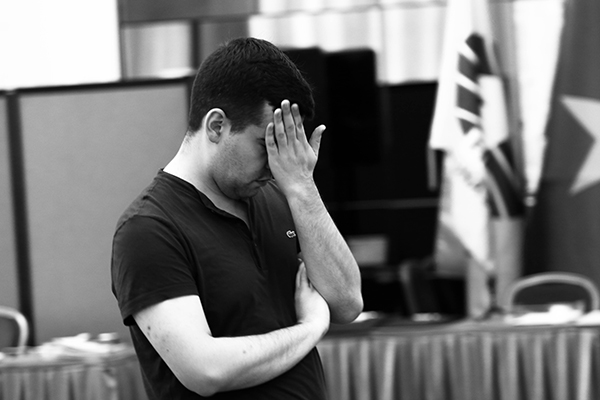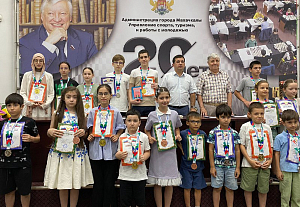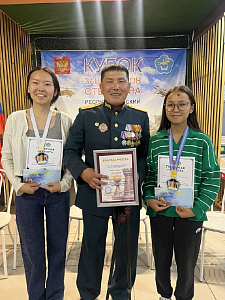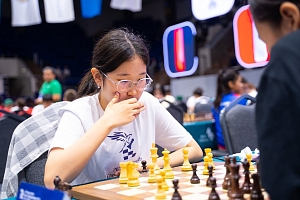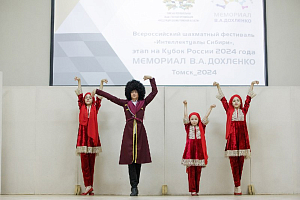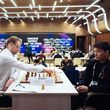Dropping of Stars from Tbilisi
1/16 matches of the World Cup in the review of Eteri Kublashvili
Day one
Even though the Kovalyov incident has shifted the vector strongly towards the circumchessic discussions, the over-the-board events have been no less exciting.
Thus, Bu Xiangzhi has defeated Magnus Carlsen as Black. The position resembled the Marshall attack, and the Chinese could not but sacrifice his bishop on h3.
Carlsen - Bu Xiangzhi
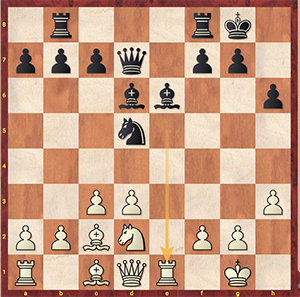
15…Bxh3! 16. gxh3 Qxh3 17. Nf1 Rbe8
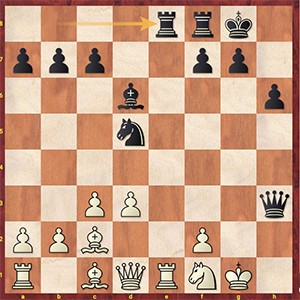
18. d4
This move was evaluated by Bu Xiangzhi as a dubious one. He thought that 18. Bd2 was a better try.
18…f5 19. Bb3 c6 20. f4 Kh7 21. Bxd5 cxd5 22. Re3?
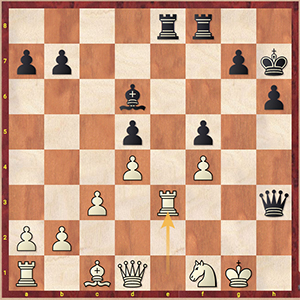
White’s latest move is a somewhat misbegotten one. He would have been better off with either 22. Re2 or even 22. Re5.
22…Rxe3 23. Bxe3 g5 24. Kf2 gxf4 25. Qf3 fxe3+
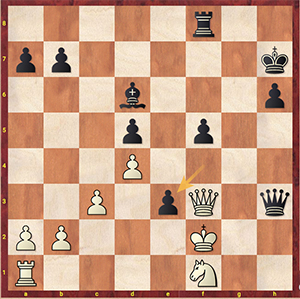
Black went on to win after eleven moves capitalizing upon White’s home rank vulnerability and his own h-passer. The final diagram is up for display in our “Position of the Day” tab of September 9.
Levon Aronian’s victory over Maxim Matlakov with play on both flanks was as though taken from a textbook of chess. Francisco Vallejo showed an overly optimistic treatment of Wesley So’s Caro-Kann defense, sacrificing an exchange and a pawn. The American was precise in converting his material edge.
The games Nepomniachtchi - Jobava, Najer-Caruana, Vachier-Lagrave - Lenderman, Nakamura-Fedoseev, Onischuk-Svidler, Artemiev-Dubov, Ivanchuk-Kramnik, Giri-Sethuraman, Ding Liren-Vidit, Li Chao-Rapport, Grischuk-Navara, and Wang Hao-Kuzubov ended in draws.
Day two
The day of counter games was no less sensational and fruitful. Fortunately, it had to do with chess only.
Bu Xiangzhi made a confident draw with Magnus Carlsen, although the World Champion still managed to introduce some complications along the way. It was yet another case of the Chinese sacrificing his rook, even if this time it resulted in a draw only.
While Vladimir Fedoseev’s win over Hikaru Nakamura as White is not a miracle, it is surely among big upsets.
Vladimir Fedoseev, “My victory over Nakamura did not come as a big surprise to me since I have been playing fantastic chess this year. Despite seeing myself as an underdog and rating my winning chances about 30 percent, I realized it was not over for me yet. In game two Nakamura must have forgotten his home analysis and his position downgraded significantly. In the course of the game, I sometimes gave him opportunities to escape, but he never used them."
Fedoseev – Nakamura
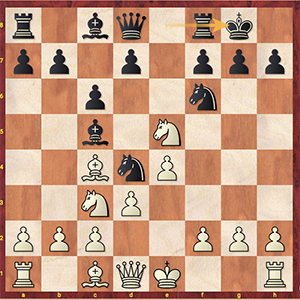
8. Nxf7! Rxf7 9. Bxf7+ Kxf7 10. Be3 Ne6?
It is hard to know for sure, but it looks like Hikaru must have either forgotten or otherwise messed up his lines here since after 11. Bxc5 Nxc5 12. e5 Ne8 13. d4 Ne6 14. 0-0 White’s position is overwhelming already, despite Black having a pair of minor pieces for the opponent’s rook.
Following his defeat, Nakamura tweeted on his account, “On the bright side, at least it looks like my houses in Florida are going to survive despite my terrible game today!”
Daniil Dubov outperformed his compatriot Vladislav Artemiev as White in game two. The opening was a Najdorf with 6.Bg5, in which the native of Moscow decided to sacrifice a piece.
Daniil Dubov, ”I got lucky. My strategy here is to create as complex positions as possible. Besides, as they say in Russia, “First you work for reputation then - the reputation works for you”. I tried to apply this rule to myself by pretending to know and remember everything. Meanwhile, my preparation was not up to the occasion. Vlad managed to take me by surprise as I was not on the alert for the Najdorf Defense. My insight into this does not seem sufficient. Therefore, I decided to bluff, which I resort to from time to time, and sacrificed a piece. In general, I cannot pinpoint the moment when I got worse, but after 21. Be1 my position was definitely inferior. As Vlad had only 15 minutes on his clock, I offered him a draw. Vlad gave it a long think and found himself in a time trouble.
Dubov - Artemiev
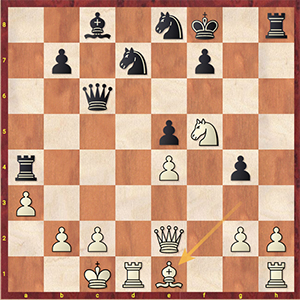
There followed 21…Ndf6! 22. Ng3 Nxe4
Vlad must have overlooked 23. Rd8.
23…Be6 24. Bb4+ Rxb4 25. axb4 Nxg3 26. Qxe5 Ke7 27. Rhd1 Rxh2
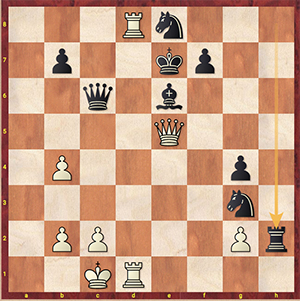
That 28. b5 made the position unclear, I realized even during the game“.
With only seconds on the clock, 28…Ne2+? came as a decisive error as there is no defending as many as three pieces at one go. Besides, a nice shot 29. Kb1 Qc4 30. Rxe8+! turned up for White, and it was before long that Black recognized his defeat.
Yet another victim out of the top ten is Vladimir Kramnik, unseated by Vassily Ivanchuk. White’s error left him down a pawn with not much compensation for it. The former world champion put up a tough defense, but Vassily’s conversion was a top class performance.
Peter Svidler outperformed Alexander Onischuk along positional lines without visible blunders from any of the players and headed for a deserved rest. Peter joked that he and Alexander were recalling that many of the current World Cup participants were not even born at the moment when they faced each other in their first game.
Yuriy Kuzubov decided to give up his bishop for two pawns against Wang Hao, but his calculations proved incorrect. The Chinese player gradually converted his edge.
Maxim Matlakov seems to have pulled off an impossible. The native of St. Petersburg bounced back on demand to even the score with Levon Aronian.
Maxim Matlakov, “It ran contrary to my expectations. Levon delivered a splendid display in game one. There was a moment when I believed I was OK, but he was outplaying me with each subsequent move. This game can be safely classified as a masterpiece.
In the return game I resorted to a line that I had played against Alexander Shimanov at the European Championships in Minsk. Besides, Peter Svidler used it to defeat Hou Yifan. On the other hand, I know that after Black's precise moves the position should be OK. It goes without saying that Levon knows these moves.
Matlakov - Aronian
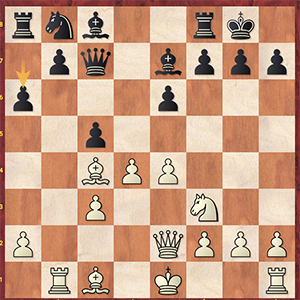
After 11. a4 cxd4 12. cxd4 Bd7 I had to sacrifice a pawn: 13. 0-0 Rc8 14. Bd3 Bxa4.
If Black meets 15. d5 with 15…exd5, I believe that after 16. exd5 Bb5 it should be a draw. Meanwhile, Levon probably wanted to outplay me yet another time and, therefore, opted for 15…Nd7, which gave rise to an interesting position. I say it is a dream position for White”.
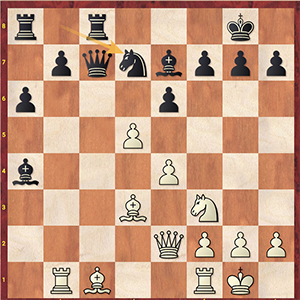
16. e5! exd5 17. e6 Nf8 18. exf7+ Kxf7 19. Nd4 Bf6
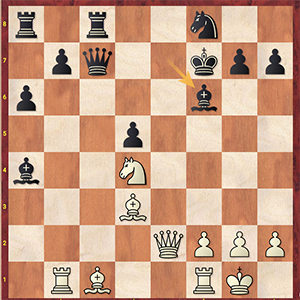
20. Bxh7! Qe5 21. Rxb7+ Bd7 22. Qg4! Qxd4 23. Rxd7+ Nxd7 24. Qxd7+ Be7 25. Re1 Qe5 26. Bd2 Rd8 27. Qg4 Black resigns.
Anish Giri was in dire straits against Sethuraman throughout almost the entire game.
Sethuraman – Giri
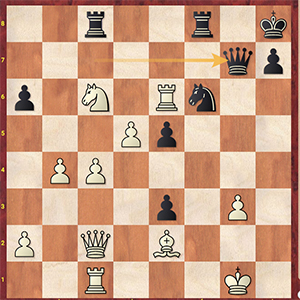
The engine points to a mind-boggling 30. g4! Nxg4 31. Rg6! hxg6 32. Bxg4 – White ends up neutralizing the opponent’s threats while retaining extra material. However, in the game Sethuraman opted for 30. Bf3, even though his winning chances still remained rather substantial. Nevertheless, Giri’s outstanding mastery and defense skills, as well as his “human” type of decisions, coupled with lack of time from his opponent, contributed to a draw result elicited by the Dutchman from a difficult position.
Less turbulent draws were sealed in the games Vachier-Lagrave - Lenderman, Li Chao - Rapport, Nepomniachtchi - Jobava (this game was a very tense one, though), Caruana - Najer, Grischuk - Navara and Ding Liren – Vidit.
Tie-break
The tie-breaker games featured the duels between Vachier-Lagrave - Lenderman, Li Chao - Rapport, Nepomniachtchi - Jobava, Caruana - Najer, Grischuk - Navara, Ding Liren - Vidit and Giri - Sethuraman.
The main sensation was an unseat of yet another top ten heavyweight Fabiano Caruana, who went down to Evgeniy Najer. The Russian took rapid game two by checkmating his opponent, which is quite a rare guest in the highest level tournament practice.
This is what the Russian women’s team coach shared about his encounter with a rating favorite:
- I think that when I captured on d4 in the opening, he could have recaptured with the pawn. However, he must have been apprehensive of some dangers arising after knight taking on f2. It seems that Fabiano’s calculation of some complex, interesting lines that I could have plunged into and not going for them afterwards for some latent fears was a share of work that he did instead of me, if I may say so. His moves only made my task easier. I am not sure that I would have found everything that he was apprehensive of. It goes without saying that a fatal mistake was his final move resulting in a checkmate, although his position looks utterly hopeless anyway.
Our readers will find the final position in our website’s “Position of the Day”.
Ian Nepomniachtchi lost his match to Baadur Jobava. All games were very tense, but in rapid game two Ian just blundered his rook. This outcome was an obvious disappointment to both players. Let us add that the Georgian player has never advanced this far at the World Cups.
Both rapid games saw Richard Rapport steamrolling Li Chao. Following a defeat in game one, the Chinese did his best to come back in game two, but ended up in a lost position instead. Rapport either kindly accepted or offered a draw himself.
In game one, Aleksandr Lenderman blundered to Maxime Vachier-Lagrave and lost. The American failed to come back and is thus out of the event.
The first Sino-Indian confrontation of Ding Liren and Santosh Vidit ended in a draw, while in the second an exemplary performance was delivered by the superior in rating to coast to victory in a confident manner.
The matchup between Alexander Grischuk and David Navara was an extremely tense one and ended in the Russian’s victory at a stage of 10-minute games. This duel is best told about by its main hero.
Alexander Grischuk, “It was a very tough match. I had great winning chances in classical game one, but offered a draw out of the opening as I believed the position to have become completely level. Somehow David declined my offer and landed into the most difficult of positions some five moves later. However, if there was a win, it was not a direct one. It is just that my chances were rather high.
I held my position in game two, which was the Petroff Opening. It was a dull game.
I could have lost my first rapid game easily since I was down a queen (smiling). I think my opponent erred more than once.
Rapid game two was perhaps the most exciting and tough. The edge was with my opponent, but then he allowed a change in move order for the sake of chess beauty:
Navara – Grischuk
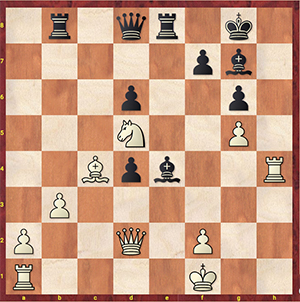
In lieu of 27. Qf4 Bf5 28. Nf6+, he first played 27. Nf6+? Nxf6 28. Qf4. This is why I did not stop to give it more thinking since this is what I intended to play against 27. Qf4 anyway; if not for this, I could have won nicely with 28…Bd3+! 29. Bxd3 Bxg5 – the-f7 pawn is not a problem in this line. If 29. Ng1, then 29…Re4.
This is a random chance that presented itself to me. That is, there is nothing extraordinary in this draw.
- Was the a6-pawn sacrificed on purpose?
- Yes, I sacrificed it for a tempo. I thought I would be better off down a pawn than getting checkmated. You know, I barely managed to keep my position down a queen.
I was probably better in the Berlin line of the Ruy Lopez, but it was a very complex setup. I got a huge edge out of the opening in the second 10-minute game as well, but then the hell broke loose… Who knows what was going on. I seem to have been making “dirty” moves, but this type of position is only for the engine to definitely say one way or another”.
Anish Giri and Sethuraman traded blows in rapid chess, but in 10-minute battles the superiority was with Anish.
Maxim Matlakov and Levon Aronian drew both 25-minute games. Then the Russian created yet another miracle by bouncing back from his loss in a ‘10+10’ encounter. However, he was unable to pull off same trick following his loss in blitz as a draw allowed Levon Aronian come through into the round of sixteen.
1/8 pairings:
Svidler - Bu Xiangzhi, Vachier-Lagrave - Grischuk, Giri - Ivanchuk, Aronian - Dubov, So - Jobava, Fedoseev - Rodshtein, Najer - Rapport, Wang Hao - Ding Liren.













